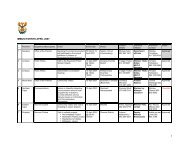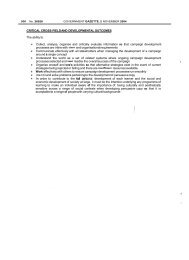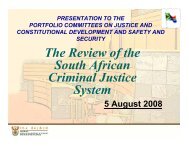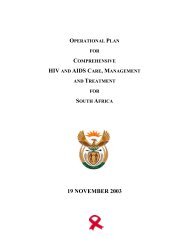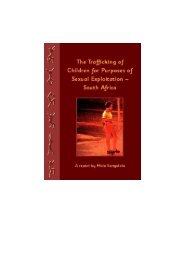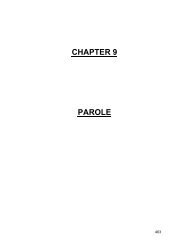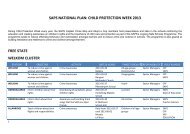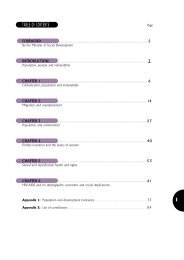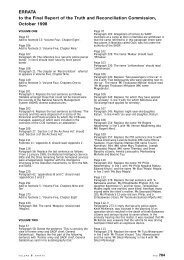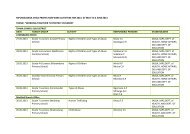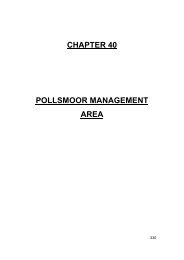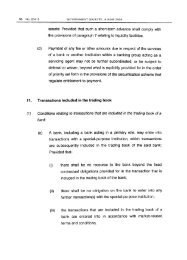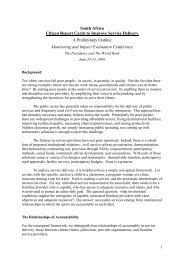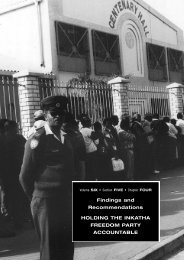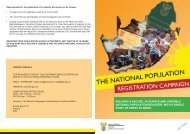Macroeconomic strategies, agriculture and rural poverty in post ...
Macroeconomic strategies, agriculture and rural poverty in post ...
Macroeconomic strategies, agriculture and rural poverty in post ...
You also want an ePaper? Increase the reach of your titles
YUMPU automatically turns print PDFs into web optimized ePapers that Google loves.
Cosatu, Sam Shilowa, responded to the macroeconomic strategy by stat<strong>in</strong>g that it would have<br />
been ‘<strong>in</strong>conceivable’ to the ANC <strong>in</strong> the period before the 1994 elections. 1<br />
With a restrictive fiscal policy <strong>and</strong> a commitment to free market pr<strong>in</strong>ciples, Gear is not<br />
very different from a st<strong>and</strong>ard IMF/World Bank structural adjustment programme. Indeed,<br />
this is a policy which owes much to the ‘Wash<strong>in</strong>gton consensus’ (Taylor 1997). The<br />
similarities between Gear <strong>and</strong> the neo-liberal model are <strong>in</strong> fact strik<strong>in</strong>g: compare, for<br />
<strong>in</strong>stance, Broham’s (1996 108) description of the neo-liberal model, which <strong>in</strong>volves the<br />
“..adoption of an open, market-led economic regime of export oriented <strong>in</strong>dustrialization<br />
based on trade liberalization, direct foreign <strong>in</strong>vestment, <strong>and</strong> the export of goods for the<br />
world market”, with Gear’s emphasis on the importance of a “competitive outward oriented<br />
economy” <strong>and</strong> a programme of “accelerated tariff liberalisation” to guarantee “a stable<br />
environment for confidence <strong>and</strong> a profitable surge <strong>in</strong> private <strong>in</strong>vestment” (Republic of South<br />
Africa 1996, 1-5). Despite its considerable deviation from earlier ANC economic th<strong>in</strong>k<strong>in</strong>g,<br />
the government’s decision <strong>in</strong> favour of a conservative macroeconomic policy emphasiz<strong>in</strong>g<br />
fiscal austerity <strong>and</strong> tight monetary control was not entirely surpris<strong>in</strong>g. Nor did it represent, as<br />
the bus<strong>in</strong>ess press has suggested, a new phase <strong>in</strong> ANC economic policy (e.g. Bus<strong>in</strong>ess Day 14<br />
March 1997). As early as 1992 there were <strong>in</strong>dications that ANC economic th<strong>in</strong>k<strong>in</strong>g was<br />
shift<strong>in</strong>g away from the proposals drawn up by Merg <strong>and</strong> towards a strategy dom<strong>in</strong>ated by<br />
fiscal restra<strong>in</strong>t <strong>and</strong> strict monetary control (Nattrass 1994). The release of the 1994 White<br />
Paper on the Reconstruction <strong>and</strong> Development Programme confirmed the direction of<br />
change <strong>in</strong> ANC economic th<strong>in</strong>k<strong>in</strong>g: the paper marked a radical reversal <strong>in</strong> economic th<strong>in</strong>k<strong>in</strong>g<br />
<strong>and</strong> a “...very significant compromise to the neo-liberal, ‘trickle down’ policy preferences of<br />
the old regime” (Adelzadeh <strong>and</strong> Padayachee 1994, 1).<br />
While Gear is a product of a new phase <strong>in</strong> ANC economic th<strong>in</strong>k<strong>in</strong>g that may be traced<br />
back to the early 1990s, various economic events <strong>in</strong> the mid-1990s ensured that the shift to a<br />
more conservative economic policy was not reversed. In 1995 the economy was faced with a<br />
balance of payments crisis that was perceived as a threat to the macroeconomic stability of<br />
the economy. And <strong>in</strong> the first few months of 1996 the value of the R<strong>and</strong> lost more than<br />
30% of its value <strong>in</strong> relation to the other major currencies. These were clearly not ultimately<br />
responsible for Gear’s emphasis on fiscal austerity <strong>and</strong> neo-liberalism; nevertheless these<br />
cont<strong>in</strong>gencies did shore up any l<strong>in</strong>ger<strong>in</strong>g support with<strong>in</strong> the ANC leadership for a strategy<br />
based on fiscal expansion as proposed by Merg <strong>and</strong> the labour movement.<br />
These debates <strong>and</strong> decisions on economic policy have come at a time when the depth<br />
<strong>and</strong> extent of <strong>poverty</strong> <strong>and</strong> <strong>in</strong>equality <strong>in</strong> South Africa is be<strong>in</strong>g exposed through an important<br />
countrywide survey on liv<strong>in</strong>g st<strong>and</strong>ards. The results of the 1993 Project for Statistics on<br />
Liv<strong>in</strong>g St<strong>and</strong>ards <strong>and</strong> Development (PSLSD) which surveyed 9,000 households has<br />
confirmed what numerous regional <strong>and</strong> local studies <strong>in</strong>dicated: that South Africa rema<strong>in</strong>s one<br />
of the most unequal societies <strong>in</strong> the world, that there is a strong race dimension to <strong>poverty</strong>,<br />
that there are more poor people <strong>in</strong> <strong>rural</strong> areas, <strong>and</strong> that women <strong>and</strong> children are affected<br />
more seriously by malnutrition, destitution <strong>and</strong> <strong>poverty</strong> (RDP 1995; May 1996; May, Carter<br />
<strong>and</strong> Posel 1995). Of all the PSLSD results the most strik<strong>in</strong>g is the depth of <strong>rural</strong> <strong>poverty</strong>: the<br />
data <strong>in</strong>dicate that three quarters of the population liv<strong>in</strong>g <strong>in</strong> <strong>rural</strong> areas live below the <strong>poverty</strong><br />
1<br />
1 Cosatu has gone so far as to suggest that it might contest the 1999 elections separately from the ANC<br />
(F<strong>in</strong>ancial Mail, 17 January 1997).



